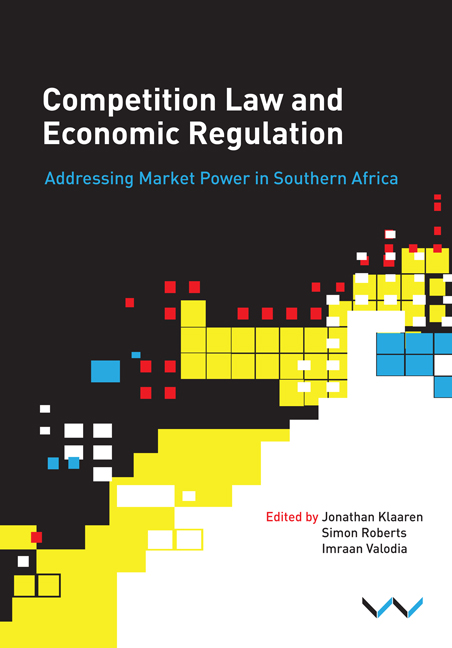 Competition Law and Economic Regulation in Southern Africa
Competition Law and Economic Regulation in Southern Africa Book contents
- Frontmatter
- Contents
- Tables, figures and boxes
- Acknowledgements
- Acronyms and abbreviations
- Introduction: The development of competition and regulation in southern Africa
- Part One Cartel law enforcement
- Part Two Issues in competition and regulation
- Part Three Competition and regulation in reshaping African markets
- 6 How multinational investments in grain trading are reshaping Zambia's market
- 7 Competition and incumbency in South Africa's liquid fuel value chain
- 8 South Africa's renewable energy experience: Inclusive growth lessons
- 9 Competition and regulation in Zimbabwe's emerging mobile payments markets
- 10 Evaluating the competitiveness of Zimbabwe's poultry industry
- Part Four Conclusion
- Contributors
- Index
6 - How multinational investments in grain trading are reshaping Zambia's market
from Part Three - Competition and regulation in reshaping African markets
Published online by Cambridge University Press: 23 March 2018
- Frontmatter
- Contents
- Tables, figures and boxes
- Acknowledgements
- Acronyms and abbreviations
- Introduction: The development of competition and regulation in southern Africa
- Part One Cartel law enforcement
- Part Two Issues in competition and regulation
- Part Three Competition and regulation in reshaping African markets
- 6 How multinational investments in grain trading are reshaping Zambia's market
- 7 Competition and incumbency in South Africa's liquid fuel value chain
- 8 South Africa's renewable energy experience: Inclusive growth lessons
- 9 Competition and regulation in Zimbabwe's emerging mobile payments markets
- 10 Evaluating the competitiveness of Zimbabwe's poultry industry
- Part Four Conclusion
- Contributors
- Index
Summary
INTRODUCTION
Multinational capital is flowing into African agrifood systems in ways that are dramatically altering how food is produced and consumed in the region. While multinational investments in African food systems are not new, shifts in the political, economic and demographic landscape of the region have expanded the scope and scale of these investments. Over the last decade or so, much of sub-Saharan Africa has witnessed rapid urbanisation, sustained GDP growth, single-digit inflation and the emergence of an African middle class (Chikweche and Fletcher, 2014; Fine et al., 2012; Losch, 2012; Ncube, Lufumpa and Vencatachellum, 2011). These domestic transformations are taking place within a global context of increasing uncertainty over global grain supplies and prices (Dewbre, Giner, Thompson and Von Lampe, 2008). The interactions between these domestic, regional and global factors have created incentives for multinational investment throughout African agrifood systems, from food production to retailing.
To date, research on the transformation of African agrifood systems has focused most intently on the rise of supermarkets (Neven, Odera, Reardon and Wang, 2009; Reardon, Timmer, Barrett and Berdegué, 2003; Weatherspoon and Reardon, 2003) and the growth in demand for African land for commercial agricultural purposes (Cotula, Vermeulen, Leonard and Keeley, 2009; Deininger and Byerlee, 2011; Hall, 2011). This research has highlighted important system-wide benefits of the corporatisation of African agrifood systems, including improved capacity to manage environmental and financial risk, the increased pace of technology adoption, and supply chain modernisation (Collier and Dercon, 2014; Minten, Randrianarison and Swinnen, 2009; Reardon and Berdegué, 2006).
However, there is considerable concern over the potential ramifications of the transformation of African agrifood systems for small-scale producers, who continue to make up the majority of the population in sub-Saharan Africa and among whom poverty levels remain unacceptably high (Haggblade et al., 2012; Weatherspoon and Reardon, 2003). This includes the displacement of traditional food markets by supermarkets, which may weaken the capacity of smallholders to tap into expanding urban-demand opportunities (Reardon et al., 2003; Tschirley, Reardon, Dolislager and Snyder, 2014; Weatherspoon and Reardon, 2003), and the enclosure of smallholder farming areas by commercial agriculture investments (Cotula et al., 2009; Hall, 2011; Jayne et al., 2014).
- Type
- Chapter
- Information
- Competition Law and Economic Regulation in Southern AfricaAddressing Market Power in Southern Africa, pp. 151 - 171Publisher: Wits University PressPrint publication year: 2017


